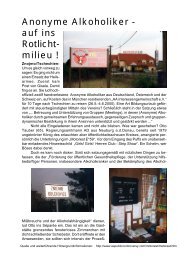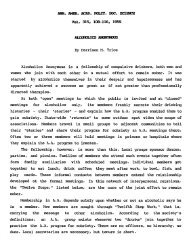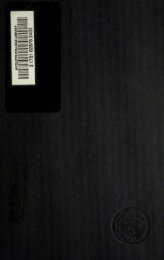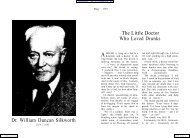The Philosophy of Courage - Alcoholics Anonymous. AA, Meeting ...
The Philosophy of Courage - Alcoholics Anonymous. AA, Meeting ...
The Philosophy of Courage - Alcoholics Anonymous. AA, Meeting ...
- No tags were found...
Create successful ePaper yourself
Turn your PDF publications into a flip-book with our unique Google optimized e-Paper software.
subjugate or slay its neighbors.”7. It becomes a monomania, where eventually everything else in the alcoholic’s lifeceases to have any importance: family, job, health, or what have you.8. It replaces real life, until eventually all that exists in the alcoholic’s mind is drinkingand thinking about drinking. [chapter 1, section II]<strong>The</strong> second item on that list <strong>of</strong> eight characteristics—fear—is especially important.Alcoholism may look on the surface like a desire or craving which has gottenout <strong>of</strong> control, but in fact the alcoholic’s thoughts and behavior are dominated atall times by an overpowering fear and horror: “His secret is not that he makes fordrink and takes delight in it as desirous people make for and take delight in thatwhich they desire. Of delight there is very little in his life, and as his dipsomaniagrows he cannot be said even ordinarily to like drink, still less to delight in it. But ashis dipsomania grows, there is something which does grow along with it and proportionatelyto it, and it is that something which explains it. It is his fear or even horror,<strong>of</strong> life without drink. That life is a wild beast which pursues him, and his dipsomania isjust a running away from it. He desires or makes for drink only in the sense in whichwe make for a refuge; drink is for him a refuge from life. His repetition <strong>of</strong> the dosesis the action not <strong>of</strong> a desirous lover but <strong>of</strong> a coward desperately defending a positionwith a repeating rifle against an oncoming foe.” [chapter 1, section II]“Desire” is bad but “passion” is goodWhen Leon argued that desire plunged us into soul-sickness, terror, and mania,it might seem that he had painted himself into a corner. For how could one desiresalvation itself or anything good without being thrown into terror there as well,fear <strong>of</strong> not achieving that goodness and salvation? Leon attempts to get out <strong>of</strong>this problem by distinguishing between desire in the selfish sense, and what he callspassion or “pure desire.” Passion is directed towards the Absolute and the Unlimited,rather than towards some specific, particular goal. In the philosophical idealism<strong>of</strong> Schelling, Hegel, and F. H. Bradley, the Absolute is the unconditional divinereality which is contrasted with the realm <strong>of</strong> space and time. Everything within theworld <strong>of</strong> space and time is limited and finite, and conditioned by its ever-changingspatio-temporal context. <strong>The</strong> Unlimited however is the infinite, and the Absolutelies totally outside the box <strong>of</strong> space and time.In Kantian philosophical terms, desire keeps us confined within the box <strong>of</strong> spaceand time (and specific, finite physical objects), while passion allows us to rise up intothe realm <strong>of</strong> the noumenon (the pure ideas) and act on the basis <strong>of</strong> a categoricalimperative (such as, for example, “always be honest and tell the truth regardless <strong>of</strong>the consequences”).Passion “is the desire that absolute love, or power or wisdom, etc., should bemanifested in whatever way it is possible for any <strong>of</strong> them to be manifested at thismoment,” without imposing, in advance, any kind <strong>of</strong> limits or overly-restrictive12















